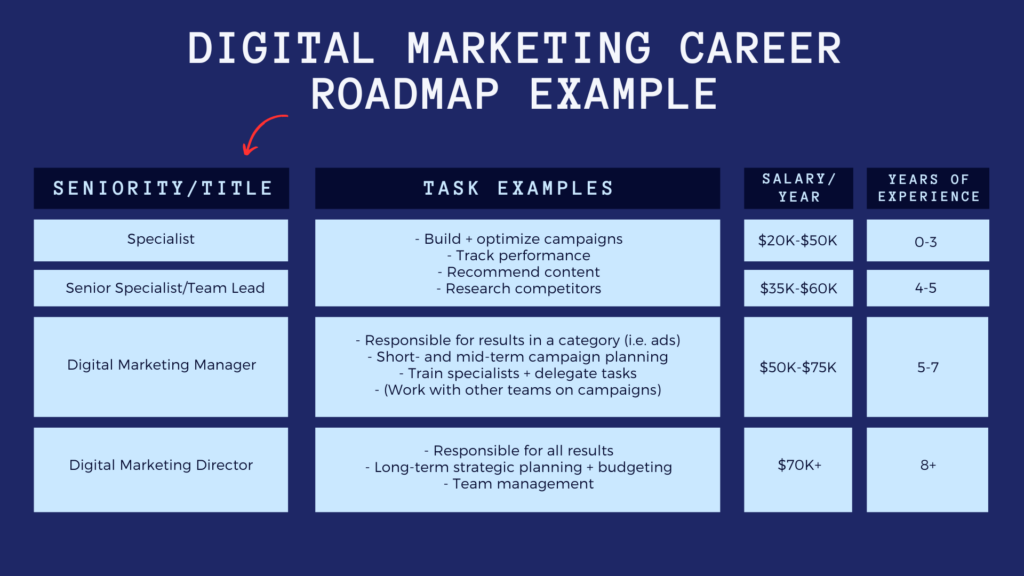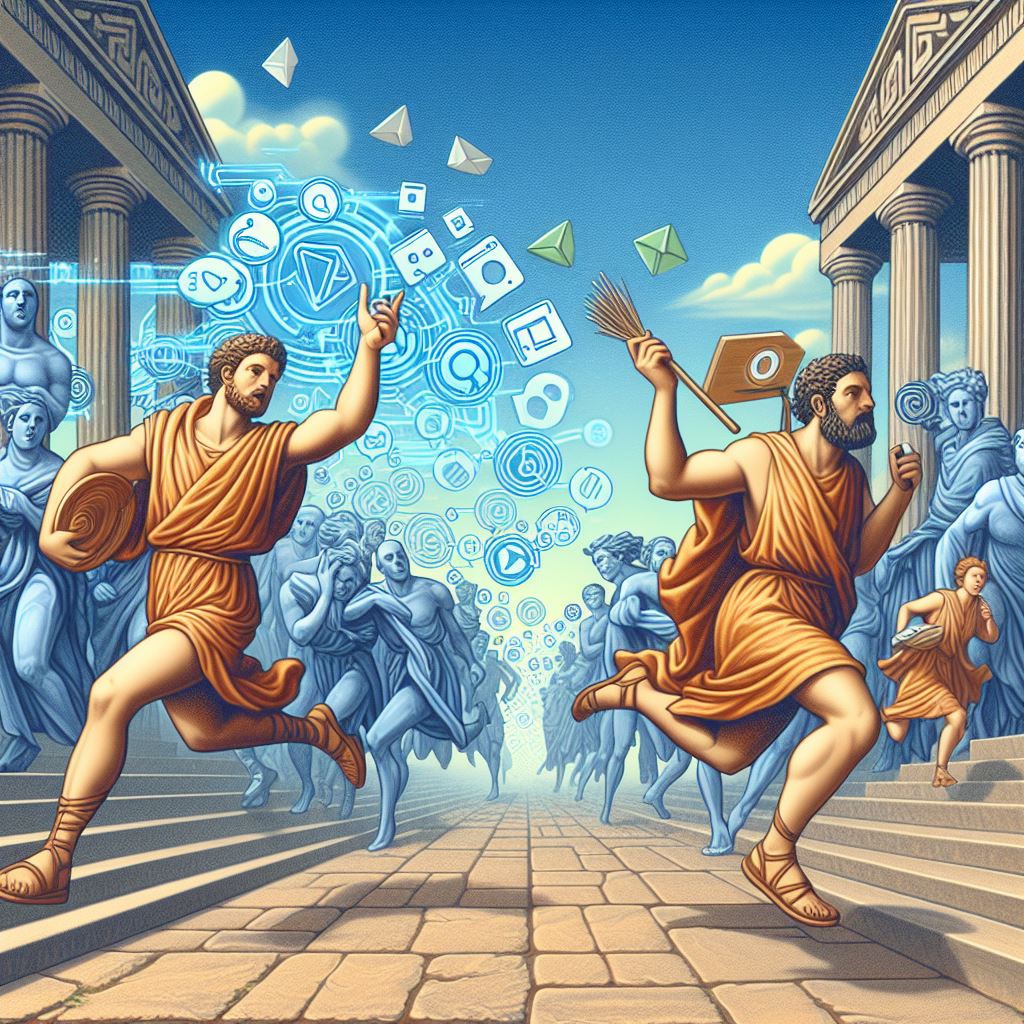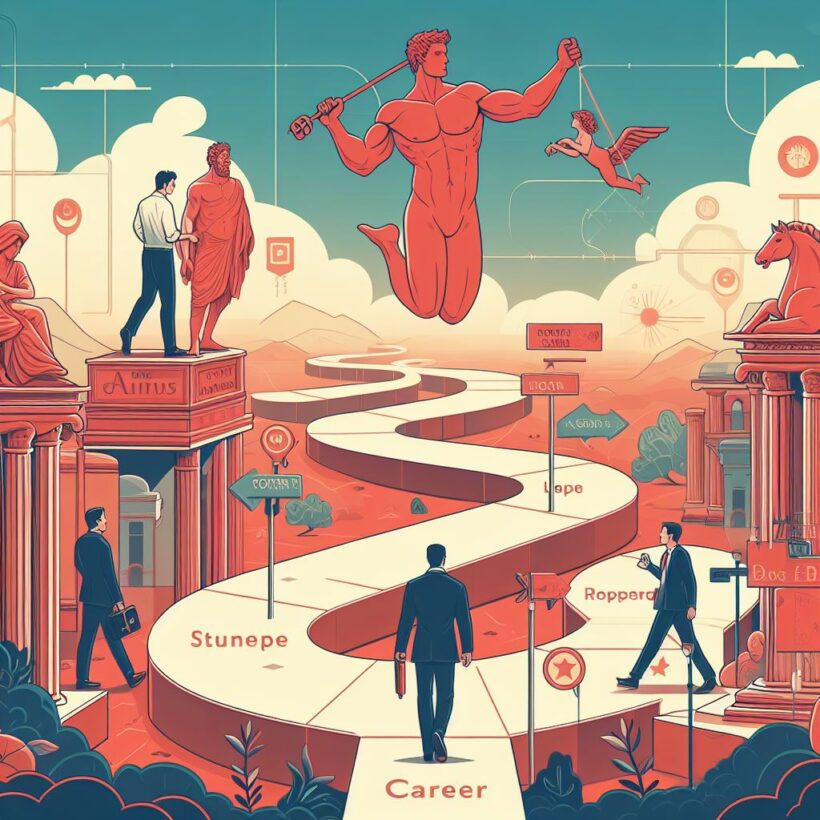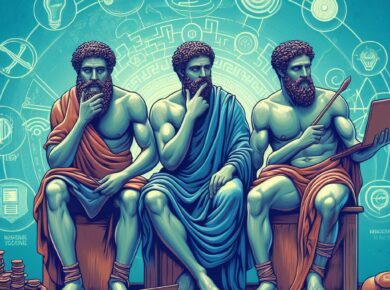As I relaxed in a hammock on a beach, enjoying a delicious coconut and shielding my laptop from the sand, it struck me just how far my digital marketing career had taken me.
Gone were the days of traditional office setups and mundane routines. Instead, I found myself with the freedom of remote work, sipping coconuts and enjoying the sunshine.
Who said work and paradise couldn’t coexist?
Now, before you start fantasizing about working from a hammock with a tropical drink in hand, let’s get real.
While a digital marketing career offers incredible perks like location independence and the ability to save for that dream vacation, it’s not all sunshine and rainbows. There’s a fair share of hype surrounding the field, and let’s face it: some people tend to exaggerate.
In this mini-guide, I’ll offer my experience of a digital marketing career based on my own decade-long journey in the industry. Consider it a compass before you take the plunge headfirst.
I’ll spill the beans on realistic salary expectations and break down what influences your compensation. But money isn’t everything. It’s also important to consider whether you’ll genuinely enjoy what you’ll be doing day in and day out.
Before we dive into the juiciest part of this guide—your compensation—let me clarify that this is intended for career-switchers and fresh grads considering the digital marketing path. If you’re already an in-house digital marketer, let me know in the comments and I might create a separate guide for you.
Let’s dive in!
Table of Contents
Demystifying popular claims: is digital marketing a good career?
If you’ve attempted to gather digital marketing salaries online, I’m sure you’ve met a wild mix of conflicting examples:
- A self-proclaimed digital marketing guru boasting a cool $1 million annual income while sipping champagne on a yacht
- A fresh grad proudly claiming a hefty $100,000 paycheck straight out of the gate
- A sneaky remote worker juggling two overlapping full-time gigs to rack up some serious cash
- And then there’s the experienced digital marketing manager earning just $40,000 a year
If you’re new to the field, it’s hard not to be confused.
The digital marketing salary hype is real
Let me tell you a little secret about salary data: it often tells only half the story.
There’s a whole bunch of factors that come into play. One person might be hustling their way up the corporate ladder, sharpening their negotiation and networking skills, while another might be seeking work-life balance because they just became a parent.
Your salary can be impacted by a million things, including the cost of living in the city where you work (no wonder salaries in San Francisco and Silicon Valley seem crazy high).
So take those raw salary numbers with a pinch of salt. When I started in this field, I took some of the bold claims too literally. But lucky for me, I jumped in when digital marketing was still brand new and few people knew what they were doing.
To keep things simple I’m breaking it down into four different levels of seniority:
- Specialist
- Senior specialist/Team lead
- Digital marketing manager
- Digital marketing director

But don’t get caught up in the illusion of linear progression and fixed salary brackets as the reality is far more nuanced.
For example, a small company hiring its first digital marketing employee might need a digital marketing manager who can handle multiple channels themselves, even if they’re not an absolute rockstar in each one. It’s a budget-friendly option compared to assembling an entire team without knowing if they’ll need it.
A yearly salary package above $100,000 is possible, but they aren’t as common as those success stories make them seem. What those stories tend to ignore are crucial details like living in a crazy expensive city with sky-high rent or having a role that extends beyond digital marketing.
Digital marketing compensation can be decent, particularly if you work remotely and find creative ways to manage your living costs. But if your goal is to get rich through a traditional job, there are more suitable career paths out there.
Speaking of remote work, let’s explore that next.
Remote work is as sexy as it sounds (if you’ve got the discipline)
Digital marketing and remote work are like a match made in heaven. The beauty of this career path is in the fact that most of the tasks can be accomplished in the comfort of your favorite sweatpants at home.
But before you start picturing yourself gallivanting around the globe with your laptop in hand, let’s do a reality check.
As enticing as it sounds, discussing and coordinating with colleagues can become tricky when you’re juggling time zones. Regularly having to catch a plane, train or something else becomes stressful while maintaining work commitments.
On the other hand, slow travel or living as an expat abroad can be a great combination with a job in digital marketing.
It’s all about finding the right balance and making sure that your company is accustomed to having remote employees.
This means putting in the effort to schedule meetings across time zones or mastering timely asynchronous communication. Remote work requires a certain level of discipline. You’ll need to carve out focused hours every workday to make sure you are on top of your responsibilities and continue to develop your skills.
Not everyone has the discipline for it and prefers to reactively respond to incoming tasks rather than taking a proactive approach.
Next, let’s consider the stress levels of a job in this field.
Is digital marketing stressful? It depends…
The stress levels depend highly on the company you work for. Allow me to explain.
Let’s start with agencies.
They often offer a more stressful environment, coupled with lower pay compared to working on the client side. But they can be an easier place to get your first job as they tend to prefer employees who are earlier in their career (though there are exceptions, of course).
On the other hand, working at a large bureaucratic corporation tends to be less stressful than an agency or a nimble startup fighting for survival. In the past, we’ve seen certain ecommerce startups live or die by their digital advertising performance, which can be stressful as marketing can amplify an already great product but can’t miraculously turn something lackluster into gold.
In the typical organizational chart, digital marketing often falls under the marketing umbrella as an important back-office support role for the sales and product teams.
Interestingly, a significant portion of the work in digital marketing can be performance-based, such as driving sales or generating leads. But unlike sales teams, compensation is rarely directly tied to performance.
In my experience, digital marketing isn’t a particularly stressful career choice, but choosing the right company (and boss) makes all the difference.
Even if the salary, remote work options, and relatively low-stress sound appealing, it’s crucial to remember that all the external perks in the world can’t compensate for a lack of interest in the day-to-day tasks or the problems you’re helping the company solve. Fulfillment and enjoyment come from finding the work itself meaningful and engaging.
Speaking of day-to-day tasks, let’s dive into what you might find yourself doing if you pursue a career in digital marketing.
Is this type of work for you? Is passion BS?
During my time as an in-house digital marketer, I’ve found that three things tend to make us enjoy a job in this space. It’s not the need to eat, having good colleagues, or other ‘external’ perks. Those don’t count as they aren’t directly related to your digital marketer career.
Instead, they are:
- The daily projects and tasks
- Our success in delivering results for the company (and our career)
- The misunderstood idea of passion
Let’s go through them one by one, starting from the top.
1. The daily projects and tasks
A day in the life of a digital marketer is far from the glamorous coffee-sipping and world-exploring scenes we often see.
It makes for more exciting video clips than watching someone calculating the clickthrough rate in Excel or editing ad copy, but it doesn’t represent the real world.
As a digital marketing specialist, especially when starting out, a significant portion of your time will be dedicated to honing your hard skills. This involves tasks like analyzing data to understand why a campaign isn’t performing as intended or optimizing content. On the other hand, communication, planning, and delegation become more important as you progress in your career.
Instead, let me attempt to give you a more realistic overview based on my own experience when I worked as a senior digital marketing specialist.
I’ll usually get up early and ease into the day while checking Instagram and having coffee. I’m running a personal experiment at the moment, so I spend the first half hour or so scrolling through my feed to check new comments and upload posts I’ve prepared in advance.
After getting ready, I’ll head to the office and investigate why the app download numbers aren’t the same across different reports. That’s a task requiring getting numbers from different dashboards like Apple App Store and Google Play, and talking with customer service for the third-party tracking tools we use before reverse-engineering the problem with test installs.
This is where things get creative.
Because this is a relatively new industry and most of it relies on tech and different tools that are being built as we speak, there aren’t always straightforward answers to these challenges. We either have to live with things not being perfect or come up with creative solutions on the fly.
That’s why it’s handy to be skilled at online research. Often someone else has had the same problem and shared their solution somewhere.
After lunch and my reporting is sorted out, I climb into the Facebook ads dashboards and optimize the campaigns by looking at the data to judge which videos and other creatives perform the best.
Later, I’ll have a brief meeting with the content team to show them which of the content they’ve created drives the most installs so they can create more of it.
I’ve only been working on social media-related projects today. Since I’m the only digital marketing specialist on the team, I’m responsible for all channels including organic search traffic from Google which I’ll play around with after getting an afternoon coffee with a colleague.
The type of decisions I have to make here is which articles on the blog are worth improving and how best to persuade the readers to download our app.
That comes down to tracking our existing performance and researching the competition along with taking note of what interests the audience that isn’t being covered well already. It’s also necessary to judge which is the best low-hanging fruit to start with to drive more installs sooner rather than later.
With digital marketing the results of our ideas can be tracked, so we can evaluate what works best and do more of that. That’s the science side of things.
I’ll use tools to look at which topics are more popular than others, compare them with the competition, and based on basic math, decide what is most likely to give us a good result. We’ll then perform experiments and compare the results with other ideas.
The last thing I do is prepare for tomorrow.
Keep in mind that this example reflects the experience of a digital marketing specialist in a small team where responsibilities span across multiple channels. In larger teams, you may focus more deeply on specific areas, like only running ads on Facebook.
Now that you have a clearer picture of the day-to-day activities, let’s move on to exploring what success looks like.
2. Our success in delivering results for the company (and our career)
You can earn good money with a job in digital marketing, especially if it is a valuable role at the company you work for. The closer your role is to driving revenue and sales, the higher the salary you can command.
Businesses that are entirely digital often view digital marketing as a primary means of attracting customers and generating sales, whereas traditional brands may see it as a cost-effective addition to their existing marketing efforts.
This is the “original” intention of marketing, but there’s a second goal that has been getting more traction over the years, especially for agencies. That is winning awards for their work.
The awards are mostly rigged marketing stunts made for agencies to offer them marketing material when pitching clients or to make employees proud. In my experience, the awards are based on subjective opinions of the campaign’s creativity and have no relation to the real purpose of marketing: selling a product.
For your digital marketing career, these awards are worthless. The work is usually done as a team effort and tends to be based on how creative you can persuade the client brand to be in their marketing campaigns.
If performance like driving sales and customers becomes your north star, the work you can influence tends to be managing digital marketing experiments like you might in a lab.
The ability to track and measure results allows you to determine what works best for your company. This approach involves running a portfolio of experiments, selecting the most successful ones, and replacing underperforming ideas with new ones.
Over time, this iterative process leads to consistent results. Making decisions about experiment duration and prioritizing worthwhile experiments becomes crucial.
If you choose a career in digital marketing, one of these two goals will become your mission: either driving sales and customers or winning awards.
Let’s move on to the next aspect: the controversial nature of passion in the day-to-day life of a digital marketer.
3. The misunderstood idea of passion
Passion is one of those words that is thrown around a lot but can be difficult to make practical. It feels like something we are supposed to have, yet it can be hard to find.
Passion is not always something we just have, but rather something we can discover and build over time. Instead of feeling pressure to have audacious goals or make grand contributions, it’s important to find enjoyment in your work and aim for a decent living without feeling trapped in a dead-end job trajectory.
To determine if you have an inclination towards marketing, consider if you naturally go out of your way to learn about it or related topics.
It doesn’t have to be taking classes or listening to podcasts, but could be that you enjoy discussing cool marketing campaigns you’ve seen in the wild.
For example, I recorded TV ads on my VHS tape when I was a teenager and now I enjoy geeking out on grassroots campaigns that no one has heard of. It’s not the end all be all for me, but it’s something I enjoy more than many other work-related things.
Since I began working with digital marketing, I’ve also come to enjoy the rush of a successful campaign matching thousands of customers with a product that solves a frustrating problem for them. It has also been a joy to build crazy-targeted ad campaigns that reach just the right people with a wacky combination of tools.
You might not be as passionate about ad campaigns as you are about competing in your favorite sport, playing Playstation, or buying shoes. But an interest can spark a passion as you develop your marketing skills and get good at them.
We hardly wake up one morning and discover that we are passionate about campaign planning in Excel, creating a promotion strategy, or configuring email software, but we might like the results that come with it.
Some digital marketers have chosen to work in an industry they are passionate about, like football or healthcare, and combine it with these practical skills.
Steal this piece of advice from my former boss
When I landed my very first internship, my boss made it crystal clear right off the bat: media buying meant little to no traditional creative work like copywriting or designing. It was like a breath of fresh air to have that clarity from day one.
Instead of dissecting digital marketing by channels like ads or SEO, let’s instead consider if you are more drawn to the classic creative side, where genius ideas from design and copywriting flow like Don Draper in “Mad Men”?
Or do you find yourself gravitating towards the structured side of things, like configuring ads, campaign planning, and calculating performance in Excel?
Digital marketing jobs can be confusing, especially when they overlap with content creation, and at smaller companies, you might be doing both if you’re the only one there.
The difference is usually that the content creator has their charming face on videos, whereas digital marketers are the masterminds optimizing those videos to rack up views by strategically ranking for specific search terms. It’s like a dynamic duo working hand in hand to conquer the digital realm.
If you dream of building your own business online one day, both tend to be complimentary as you’ll build the skills to market your stuff.
Now that you have a good sense of what a career in digital marketing is like, it’s time to address the elephant in the room: AI, the future of digital marketing as a career path, and how it may impact your job.
Future-proofing your career: how AI will impact your work
No matter what you prefer, it’s hard to know where you’ll end up in the long run.
A career in digital marketing is still so fresh that no one has spent their entire professional life in this field. It’s like we’re pioneers, venturing into uncharted territory, armed with laptops and coffee-fueled brainstorming sessions.
After about a decade, many set sail for new horizons. Some move into general marketing management while others move to sales or product marketing if they don’t start their own business.
Before wrapping up this guide, let’s dive into the crystal ball and the future of digital marketing as a career choice. Now, keep in mind that this is pure speculation, so take it with a grain of salt.
Two big questions loom over the future of digital marketing: Will it become a commodity? And will it be automated?
In many ways, digital marketers are already a commodity. Just take a look at content writing for search engines or running Facebook ads: it has become so popular that finding employees or contractors to assist with these tasks is a breeze.
In fact, there are so many digital marketers out there that it can be challenging to tell them apart. They’ve all written for prestigious publications or generated mind-blowing returns on ad campaigns, and they all come with glowing testimonials.
So, how can you stand out from the crowd?
Technical expertise will likely become even more commoditized or automated but that leaves something else.
Beyond mastering the hard skills, I’ve discovered that honing your interpersonal skills can be a game-changer. Building trust with colleagues and bosses is an art form that takes time and effort, and it’s difficult to replace.
In other words, digital marketers are a dime a dozen. GOOD digital marketers are rare and worth their weight in gold as AI will enable them to do even more.
Some tasks that are currently part of the daily grind, such as dreadful data entry or crafting multiple variations of the same three-line social media post, will soon be taken over by AI (in fact, they already have for some of us).
It doesn’t mean your life will become a dystopian nightmare or that it’s time to start painting the devil on the wall.
Automation has the potential to free you from those mundane and repetitive tasks, replacing them with more meaningful and strategic work. It’s like having a personal assistant who takes care of the boring stuff so you can focus on the big picture.
In potentially industry-changing situations like these, you’ll usually see the waters divide into two camps.
Many will flee the digital marketing career path and look for new things to do while others will lean in and adapt.

Things often get hyped up and rarely turn out as dire as they initially sound. If you choose the latter path, I bet you’ll find yourself accomplishing more in less time with the assistance of AI.
That being said, AI will reshape the digital marketing landscape as it becomes more integrated into our workflows, but trust in AI’s performance is still low so the transition will be slow.
I like to think of AI as a tool, like a hammer: it can make it easier to hit that nail into place, but the human touch is still essential.


